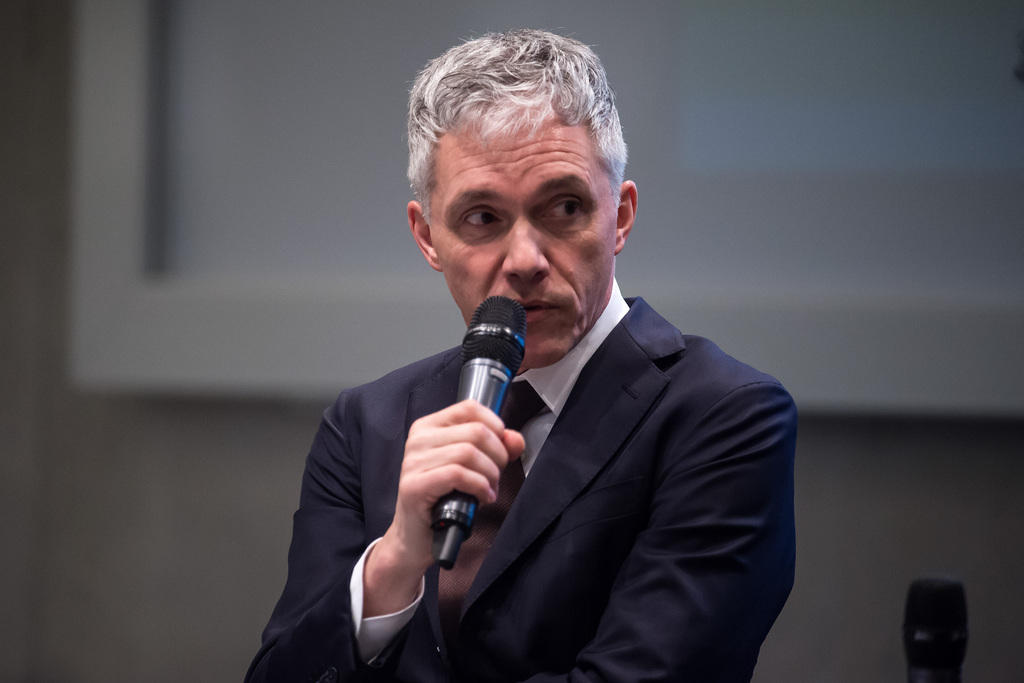
Swiss financial sector ‘vulnerable’ to crime

Switzerland’s financial centre is a strength but is also a weakness when it comes to money laundering, according to Attorney General Michael Lauber.
Speaking at an event in Lugano on organised crime, Lauber described the financial centreExternal link as a vulnerability, saying the authorities needed to remain vigilant against organised crime. Indeed, the government itself notes that “since such services are clearly of interest not just to legitimate businesses but also to criminal organisations and individuals, it is important to maintain safeguards against abuses”. In all, the financial sector accounts for 10% of economic output.
swissinfo.ch/tvsvizzera.it: Which Swiss sectors are most sensitive to organised crime?
M.L.: It’s necessary to stay vigilant, because every liberal system – whether it’s the foundation of a company, a financial centre, real estate – all could be abused by criminals, and especially by criminal organisations that have enormous financial power. We see now that in Italy, it is pushing north…and as Switzerland is north of Italy, it is there that one must remain vigilant.
swissinfo.ch/tvsvizzera.it: The southern Swiss canton of Ticino is north of Italy. Is this canton a hotspot?
M.L.: Cases of organised crime don’t just affect Ticino, because this isn’t just a Ticino phenomenon. It is also a Swiss phenomenon. Switzerland has good infrastructure, a rule of law that works well, and the financial centres, and it is also there that we are most vulnerable. And that’s what the criminals are looking for in Switzerland, according to our investigations and according to our Italian colleagues. Our strength and at the same time our weakness is what must be well protected, and is where it is necessary to stay vigilant.
swissinfo.ch/tvsvizzera.it: CHF6 billion ($59.4 billion) has been seized as a result of operations against international money laundering and corruption. Are these primarily Italian funds?
M.L.: I cannot tell you how much of the CHF6 billion we have blocked in Switzerland is linked to Italian mafia cases. What I can tell you is that it is all linked primarily to money laundering and international corruption. And as we can say that the mafia phenomenon is affiliated with money laundering and corruption, a part of that sum is certainly linked to mafia cases, but certainly not the majority.
swissinfo.ch/tvsvizzera.it: Is there good cooperation between cantonal and federal criminal institutions?
M.L.: We do not have jurisdiction over tax offences; we have jurisdiction over money laundering, although there may be an underlying possible tax offence. And there it is necessary to make a distinction: tax authorities are purely cantonal, but if there is a link to money laundering, it could fall under federal purview. What we can do is ameliorate coordination with the cantons.
swissinfo.ch/tvsvizzera.it: Are existing legal instruments sufficient to combat organised crime?
M.L.: We have article 260 of the Swiss criminal codeExternal link, which has existed since the 1990s and was intended to improve mutual legal assistance, especially with Italy. And in this domain it works really well. But if one wants to have purely Swiss investigations to fight against the mafia phenomenon and criminal organisations, we should change this law.
swissinfo.ch/tvsvizzera.it: Are Swiss public prosecutors prepared to fight organised crime?
M.L.: I think that the Swiss public prosecutors are, in principle, well trained. But it should be noted that further training is constantly needed. Not only concerning cybercrime, but also in how one does interrogations, how one understands economic phenomena…and that’s where investigations begin. The legal part comes at the end, and not the other way around.
Translated from French by Celia Luterbacher

In compliance with the JTI standards
More: SWI swissinfo.ch certified by the Journalism Trust Initiative





























You can find an overview of ongoing debates with our journalists here . Please join us!
If you want to start a conversation about a topic raised in this article or want to report factual errors, email us at english@swissinfo.ch.